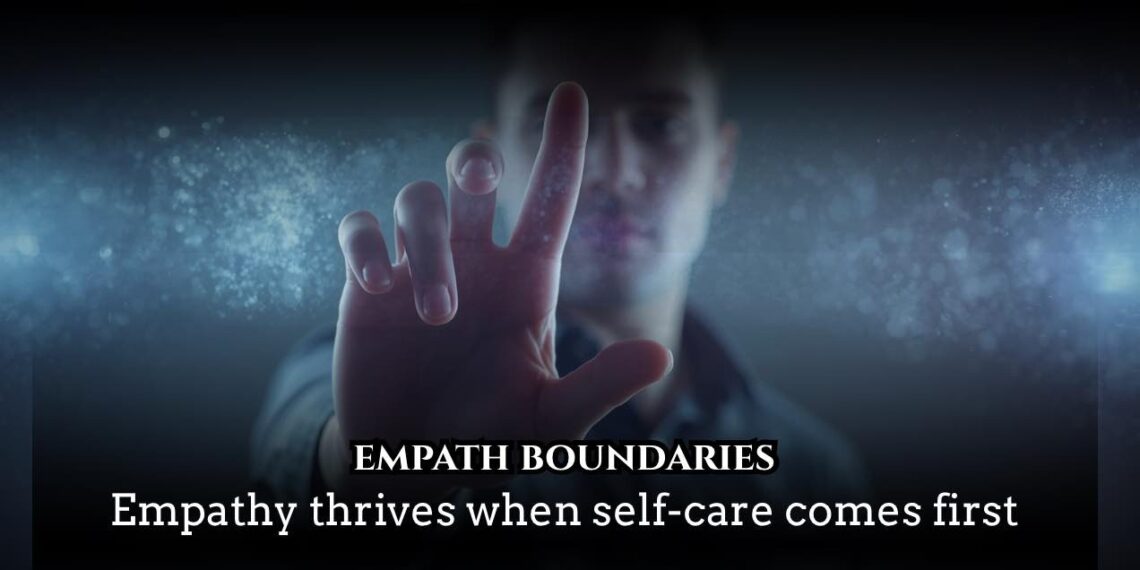Empath boundaries are essential for women who often absorb the emotions and energy of those around them. Many empathetic women find themselves emotionally drained, struggling to balance caring for others while maintaining their emotional well-being.
This article explores practical ways to protect your mental health and personal energy without losing your natural compassion. You’ll learn how to set healthy limits, recognize emotional overload, and nurture yourself while still being supportive. Understanding how to create safe emotional spaces can empower women to stay connected without feeling consumed by others’ feelings. By the end, you’ll discover that setting boundaries isn’t about becoming distant it’s about building self-awareness and resilience that allow your empathy to thrive in a balanced, healthy way.
Understanding Empath Boundaries
Empath boundaries are the invisible lines that help emotionally sensitive individuals separate their own feelings from those of others. Women, in particular, often face unique challenges in maintaining these boundaries because of their nurturing nature and strong sense of emotional connection. Without clear limits, an empath can easily become overwhelmed, exhausted, and even experience symptoms of emotional burnout. Establishing boundaries doesn’t mean caring less it means caring wisely.
What Does It Mean to Be an Empath?
An empath is someone deeply attuned to the emotions, energies, and moods of those around them. They don’t just sense feelings they feel them as their own. While this deep emotional intelligence can be a gift, it can also become draining if not managed well. Learning to distinguish between one’s own emotions and those absorbed from others is a key part of building healthy empath boundaries.
Traits of an Empath
- Deep compassion and understanding
- High sensitivity to others’ emotions
- Strong intuition and awareness
- Easily overwhelmed in crowded or tense environments
- Difficulty saying “no” or turning down requests
These traits can make empaths incredible caregivers, partners, and friends but without boundaries, their mental healthcan suffer.
The Importance of Setting Empath Boundaries
For women, setting empath boundaries is crucial for maintaining emotional balance and personal strength. It allows them to protect their energy, make thoughtful choices, and maintain healthier relationships.
Why Empaths Struggle With Boundaries
Many empaths grew up in environments where they felt responsible for others’ emotions. Over time, this conditioning can make them feel guilty when prioritizing themselves. Cultural expectations also play a role society often praises women for selflessness, reinforcing patterns of emotional overextension.
Common signs of weak boundaries include:
- Constant fatigue or emotional exhaustion
- Difficulty identifying one’s own feelings
- Anxiety after spending time with others
- A sense of guilt when practicing self-care
When these signs appear, it’s a signal that boundaries need to be strengthened.
Benefits of Building Healthy Empath Boundaries
Setting empath boundaries creates space for personal growth and deeper self-awareness. It allows women to use their empathy as a strength rather than a burden.
1. Improved Emotional Health
Clear boundaries reduce emotional overload, helping empaths stay calm and centered. This balance makes it easier to respond thoughtfully instead of reacting impulsively.
2. Stronger Relationships
Healthy limits prevent resentment and codependency. When empaths communicate their needs, relationships become more mutual and respectful.
3. Enhanced Self-Confidence
By setting boundaries, women learn to trust their intuition and make decisions aligned with their values. This strengthens both self-esteem and independence.
4. Greater Energy and Focus
With boundaries in place, energy once spent on absorbing others’ feelings can be redirected toward creativity, career goals, and personal growth.

Challenges in Maintaining Empath Boundaries
Even after setting boundaries, empaths may face difficulties in keeping them intact. Old habits, guilt, and social pressure can all interfere.
Emotional Guilt
Empaths often feel selfish when saying no, even when overwhelmed. Overcoming this requires understanding that self-care is not selfish it’s essential for sustainable compassion.
Fear of Rejection
Some fear that setting boundaries will make others view them as cold or distant. In reality, healthy boundaries often earn respect and create more authentic connections.
Overexposure to Negativity
Constantly engaging with stressful environments or negative people can erode even the strongest boundaries. Limiting exposure and creating emotional protection rituals can help.
How to Strengthen Your Empath Boundaries
Creating empath boundaries is a continuous process. Here are some effective strategies to protect your energy and well-being:
1. Recognize Your Emotional Triggers
Pay attention to what situations or people drain your energy. Awareness is the first step to prevention.
2. Practice Grounding Techniques
Grounding helps empaths stay centered in their own emotions. Try:
- Deep breathing or meditation
- Spending time in nature
- Journaling your thoughts and feelings
3. Communicate Clearly
Be honest and gentle when expressing your limits. For example, say:
- “want to help, but I need some time to rest and recharge.
- “I understand your feelings, but I’m unable to handle this at the moment.”
4. Prioritize Alone Time
Regular solitude allows empaths to process emotions and regain inner balance. Use this time for mindfulness, reading, or any activity that recharges your spirit.
5. Visualize an Energy Shield
Imagine a protective bubble of light around you. This mental technique helps block negative energy and preserve your inner peace.
6. Seek Support
Therapists or emotional wellness coaches can help empaths learn practical boundary-setting techniques. Talking with like-minded individuals can also reduce isolation.
Real-Life Example
Consider Sarah, a nurse who often felt drained after long shifts. She realized she was absorbing her patients’ pain. By learning to take breaks, practice grounding, and say no to extra shifts, she restored her energy without losing compassion. Her emotional balance improved, and she became even more effective in her work.
Conclusion
Building strong empath boundaries is essential for women who want to nurture others without losing themselves. By recognizing emotional limits, practicing self-care, and setting clear intentions, empaths can protect their energy and sustain genuine compassion. Healthy boundaries create space for personal growth, balance, and emotional freedom. Remember, caring for yourself first allows you to care for others more deeply. Continue exploring strategies to strengthen your empath boundaries and stay connected to your inner peace while sharing your light with the world.





